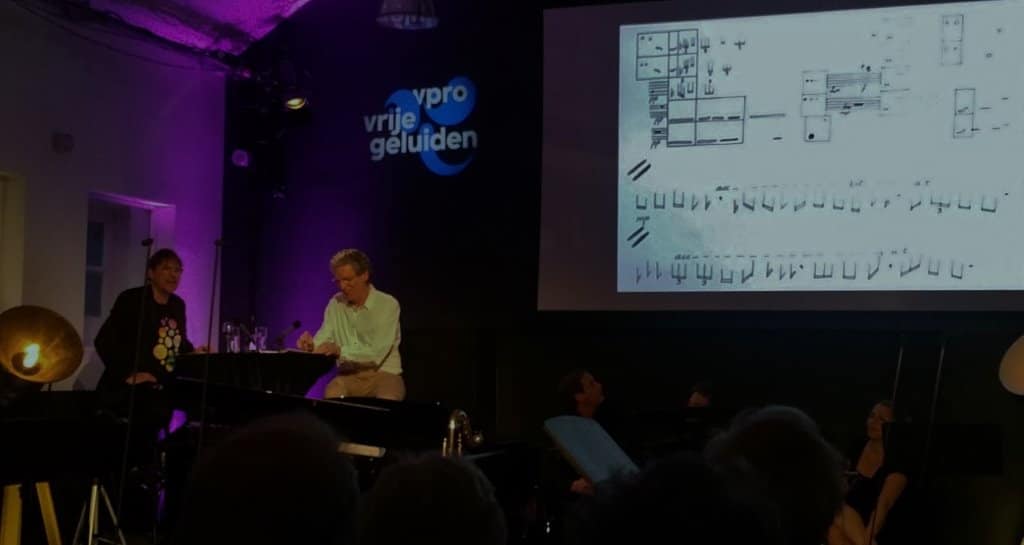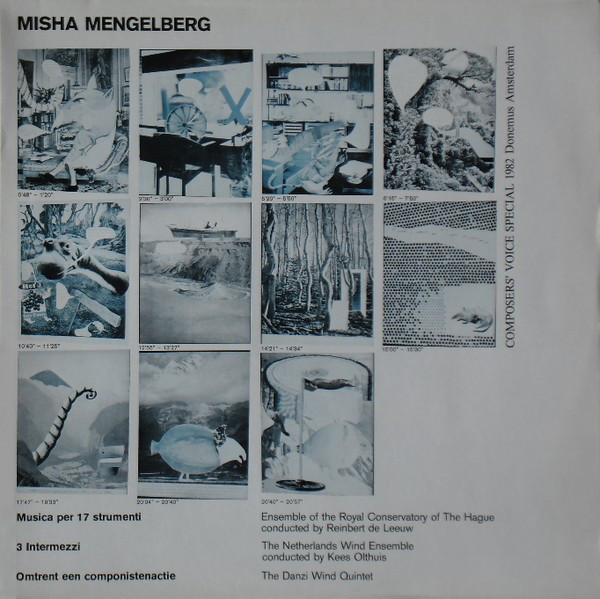The Orphanage of Dutch music presents monthly 'forgotten Dutch masterpieces' at Amsterdam stage Splendor. 'To discover the finer points', these are performed twice, interrupted by 'a short commentary or interview with special table guests'. On paper, a golden formula. Rightly so, the Holland Festival adopted three episodes. The music was spot on during the opening concert on Thursday 8 June, but the introductory talk turned out to be a failure.
Composer action or Nutcracker action?
Table guest Wim Laman served up facts about On a composer action from Misha Mengelberg (1966) fell flat. In this witty piece, Mengelberg vented his frustration at the fact that composing in the Netherlands was "a money, nerves and night's rest grubbing hobby". He wanted to bring about more government support for composers.
Laman, however, spoke of a protest against "the conservative programming of Dutch orchestras". He obviously had in mind the Nutcracker action, which took place only three years later. Table host David Dramm did not correct him, confusing the (connoisseur) audience. 'Wikipedia' someone next to me whispered.

Seriousness reduced to joke
Consequently, the second performance was anything but a deepening experience. That the musicians throw thickly filled binders, shout excitedly at each other, honk at each other with raised fingers, handle the craziest whistles and rattles and produce all kinds of animal noises was reduced to a harmless form of 'disruption'. Thus, Mengelberg's message was completely lost, as the phrases uttered were inspired by the woolly language of officials.
Together with Peter Schat and Rob du Bois, Mengelberg had been campaigning for the establishment of a Fund for Creative Music since 1964. On a composer action is a parodic account of the tough obstruction they encountered in the process. The title refers to a survey the action committee sent to composers in January 1965 to gauge their willingness to take action. - Incidentally, Mengelberg not only wrote the music, but also created colourful collages to accompany it.
Potty squabbling
Behind the musicians, we saw colourful, wondrous beasts and (hard to decipher) quotes in speech bubbles. For example: 'Investing in shrinking police should be a profitable business for the government.' In a landscape full of penguins, three socks hang on a clothesline. Says the first: 'Nice, that action.' The second: 'Very nice.' The third: 'Particularly nice.'

Mengelberg composed On a composer action for the Danzi Quintet, which had its world premiere at the Holland Festival in 1966. (I recently broadcast a recording of this in Panorama the Lion on the Concertzender).
Then, when the Fund for Creative Tone Art was finally established in 1982, the piece was performed again at a celebration on 28 April at the Ysbreker.
Over four decades after its creation, it is still fresh, partly because of the musicians' apparent pleasure in playing. Hats off to Jeannette Landré (flute), Dorine Schoon (oboe), Jesse Faber (clarinet), Marieke Stordiau (bassoon) and Laurens Otto (horn). Thanks to them, the ludicrousness of the civil service squabbling became somewhat palpable after all.
'Piepknor' remains proudly overiend
Equally convincing sounded Serie per sei strumenti (1960) by Mengelberg's contemporary and companion Jan van Vlijmen. Instead of a horn, this sextet includes a trumpet (Bas Duister) and is completed by a piano (Pauline Post). Unlike Mengelberg, van Vlijmen was a staunch modernist. His piece is arranged according to serial principles, with pitch being determined by a twelve-tone sequence.
In the first movement, the musicians bounce short phrases at each other, placed like objects in space. Their lines are more melodic in the second movement, in which they also step forward soloistically. This kind of music is often disparagingly called 'squeak-grunt', but that does van Vlijmen's piece a disservice. Despite its strict compositional method, it has a playful character; it stands proudly even in 2017.
The evening opened and closed with Reisefieber by Willem Breuker, the 'tune' of Orphanage of Dutch music. Musically, the evening was like a house, but the non-information during the talk left me with a catty feeling. A disgrace for the Holland Festival. Next week we will hear music by Hendrik, Jurriaan and Louis Andriessen. - Since Louis himself will be joining us as a guest, the transfer of information should be fine then.

Sorry Thea, but I wonder what your motives were for shooting from the hip right at the beginning of your review with the comment that "the trivia enumerated by [me]" about Mengelberg's piece "didn't make any sense". In the sequel, you also substantiate this blanket statement with no valid argument whatsoever. All you put forward is a quote taken out of context. According to you, I would have noted that Mengelberg's "Omtrent een componisten-actie" (from 1966) would have been a protest against the programming of the Dutch orchestras at the time. To reinforce your claim, you thereby post the photo of his score, which was projected during the conversation. Sorry Thea, but I fear you have not been paying close attention or had some other motive for putting my statement in the wrong context. First: the statement you quoted, I made at the time when a picture from 1966 showed a discussion on TV between the board of the Concertgebouw Orchestra and van Vlijmen/Mengelberg c.s.. This included an attempt to question the artistic policy of that orchestra - which incidentally failed. Secondly, you wrongly assume that I was referring to the Nutcracker action (1969, Concertgebouw). That is 'hineininterpretieren' on your part: that action was not at all under discussion at that time.
Your comment with which you interpret Misha's piece in the context of the action to establish the Fonds voor de Scheppende Toonkunst (FST) is only partly correct. Of course: frustrations were also expressed at the time about the lack of government support for composers. There was arguably a mismatch between subsidies for opera and orchestras and those for composers. But the actual creation of the FST was not initiated until the late 1970s. As a board member of the GeNeCo, I witnessed from close by how Reinbert de Leeuw and Theo Loevendie, respectively, worked hard to persuade the then Ministry of CRM to realise the FST. And yes, when the FST was finally a reality in 1982, Misha's composition was brought out again...
But what I find incomprehensible is that in your review you largely ignore the fact, that the concert in Splendor - including the talk by David Dramm and me - was aimed at getting both pieces out from under the dust again and - above all - to interpret them in their context, namely the turbulent 1960s. Did it escape your notice that I related van Vlijmen and Mengelberg to their mentor and role model, Kees van Baaren, then director of the Royal Conservatoire ? That I briefly outlined both the musical and ideological backgrounds of Mengelberg and van Vlijmen ? Did it slip your mind that I compared both composers and that I placed Misha's piece not only in the context of the composer-actions at the time, but also of Fluxus, of PROVO - and that I called him a 'cross-thinker'? Apparently so, when you tellingly speak of 'non-information' - again without any substantiation. Therefore, in conclusion, I leave your tendentious opening ('the Holland Festival blames itself'), the name-calling in your last paragraph and your wikipedia sneer for what they are: vicious quasi-journalism, a disgrace for the Culture Press. Wim Laman
Thanks for your response. My criticism related to the misleading information provided with About a Composer's Action by Misha Mengelberg. The impression was given that the piece would refer to the many protests against the orchestras' supposedly conservative programming. (Which naturally led the audience present to associate it with the 1969 Nutcracker action). However, the piece originated from Mengelberg's involvement in the establishment of a Fund for Creative Music, along the lines of the Fund for Literature.
Quote:
"In December 1964, Misha Mengelberg and Peter Schat discussed the possibilities of a composers' action with Ed Hoornik, one of the initiators of the writers' protest. Shortly afterwards, together with poet Bert Voeten and Rob du Bois, they form an action committee, which formulates a number of demands in early January 1965. After this, the committee is expanded to include Marius Flothuis, Lex van Delden, Robert Heppener and Nico Schuyt, and a survey polls willingness to take action among composers*."
This survey is sent to 175 composers, which explains the text accompanying one of Misha's collages: 'After a week, 75 composers had replied. 100 reminders were sent.'
Salient detail: the Kees van Baaren you mentioned was against the creation of such a fund:
Quote:
"Opponents include such luminaries as Kees van Baaren and Hendrik Andriessen, who fear that awarding stipends and fixed basic fees for compositions could come at the expense of quality. According to Van Baaren, this could even lead to "frequent writing".
Like several proponents, they also point to the problematic aspect of assessment: who decides which composer and which composition is worthy of being honoured, in whatever form? Advocate Jan van Vlijmen also mentions this problem and emphasises that a composer must keep in touch with musical life, as a musician, teacher or otherwise. A complete dependence on the fund is therefore undesirable."
Incidentally, Reinbert de Leeuw only became actively involved in 1979, when the Fonds voor de Scheppende Toonkunst was already largely on track.
Quote:
"Because of the just introduced Compatibility Act, the fund cannot start as early as 1978. Pending a reparation law, Minister Til Gardeniers asks the working group to distribute the available funds in the spirit of the draft statutes until the actual establishment of the Fund for Creative Music.
So when De Leeuw becomes president of the GeNeCo a year later, the fund is already functioning unofficially, albeit not yet in the exact form and with the budget that was its starting point. Shortly after taking office, in October 1979, he wrote a policy plan on behalf of the board, detailing the draft statutes and by-laws."
This background information does seem to me to be important for a proper understanding of the piece. Moreover, the witty thing about Omtrent een componistenactie is that Mengelberg parodies not only the official obstruction, but also the mutual squabbling of the composers.
The above quotes are taken from my biography Reinbert de Leeuw, man or melody, which describes the origins of the Fonds voor de Scheppende Toonkunst in detail. https://www.leporello.nl/l/rdl/rdl.html
Best regards, Thea Derks
Very understandable that you post this. But you will also understand that an 8-minute intermission talk about 2 composers is different from a comprehensive, scholarly study. Again: David Dramm and I wanted to outline in a short space of time the context of 2 salient compositions from the turbulent 1960s. Then it is inevitable that you cannot address - let alone deepen - all aspects of them. I do maintain, however, that Misha's rehashed piece in the Orphanage concert was not just about the remuneration of composers, but that he also wanted to take a playful look at the civil service, the endless meetings of activist composers and musicians, modernist composing and the reactions to it (e.g. from Hans Henkemans, who considered it 'sonic'). Taking this into account, you will also understand that your review went down the wrong way with me. Well, as far as I am concerned: discussion closed, sand over it !
Thank you for your response. Maybe I shouldn't have mentioned your name, but then again I thought that was strange, because then you withhold information from the reader. Anyway, of course it didn't have to become a whole exposé, but the concrete reason could have been mentioned :-). But as far as I'm concerned, too, let's leave it at that!
Comments are closed.